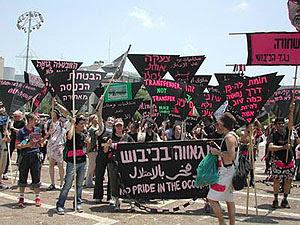Last week was very much associated with the LGBTQ1community, both for the good and for the sad. Last Thursday, Jerusalem held its 10th Gay Pride Parade, while on Saturday, the Tel Aviv community commemorated the third anniversary of the shooting at an LGBTQ centre that left two dead and fifteen wounded on August 1st, 2009.
 Notwithstanding such incidents, Israel is usually considered a country that proved itself to be relatively open towards its LGBTQ community and the legislature concerning the community has been assessed to be amongst the most developed ones in the Middle East and Asia as a whole.
Notwithstanding such incidents, Israel is usually considered a country that proved itself to be relatively open towards its LGBTQ community and the legislature concerning the community has been assessed to be amongst the most developed ones in the Middle East and Asia as a whole.
Like many other countries that, prior to colonisation, had no laws prohibiting same-sex practices, Israel inherited the British sodomy law, which criminalised same-sex relationships between men (women are not being mentioned), as a leftover from the British Mandate over Palestine. There is however no record of this law ever being enforced in the Israeli state and the prohibition of same-sex practices was formally repealed by the national legislative assembly in 1988.
Israeli gay and lesbian couples enjoy many of the rights that heterosexual couples enjoy, yet the power accorded to Jewish Orthodox authorities to determine at least partly Israeli legislation, does interfere with the freedoms of the LGBTQ community. Due to an absence of the possibility to perform civil marriages on Israeli soil, for example, are gay and lesbian couples, just like inter-religious couples, forced to marry outside of Israel. Their marriages are however accepted by the Israeli state and more recently LGBTQ couples also succeeded in court to defend their right to adopt children.
The 1992 legislation to prohibit employment discrimination on the basis of sexual orientation allows for some exemptions for religious organisations, and thereby implicitly sanctions the Orthodox view on same-sex practices and homosexuality.
 |
| Orthodox Jews protesting against the Pride Parade in Jerusalem |
From a legislative point of view the situation of the Jewish lesbian and gay community in Israel can probably be assessed in relatively positive terms2, but equality really happens on the streets and also the streets of Israeli cities and towns are not all painted in rainbow colours.
Notwithstanding the troubling 2009 incident, Tel Aviv is unquestionably the most open minded place in Israel and in 2012 topped a survey to find the most popular city destination for gay travellers3. Tel Aviv mayor Ron Huldai was quoted as being very proud of the result and hailed his city as one that “respects all people equally, and allows all people to live according to their values and desires.” Jerusalem’s former mayor, the Haredi Jew Uri Lupolianski on the other hand, did not take so much pride in the LGBTQ community of his city and in 2006 attempted to thwart the annual march.
The differences in terms of the openness of Israel’s main cities becomes very obvious during those annual public celebrations. While the Tel Aviv pride is more of a street party that is embraced by many of the city’s residents, the Jerusalem parade is considered a provocation and/or even an abomination by many Jerusalemites and has been and continues to be frequently attacked4.
 |
| “No Pride in the Occupation” – radical block in the Tel Aviv Pride Parade |
The pride marches also provide an arena for the admittedly small radical section of Israel’s LGBTQ community to raise attention to their opposition to the continuing Occupation, with slogans such as “No Pride in the Occupation”.
According to these activists the state uses the LGBTQ community as a propaganda tool. By emphasising the relative freedom and equality the community enjoys, Israel promotes its self-image as the “only democracy in the Middle East” and thereby deflects from the continuation of human rights abuses committed against the non-Jewish populations within and beyond the Green Line. This discursive move, which by now has acquired the established term of “pinkwashing”, also typically includes an emphasis on the supposed “backwardness” and intolerance of Arab/Muslim societies, particularly the Palestinian one, towards LGBTQ people.

Comment (0)